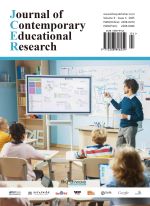Abstract
The extensive application of artificial intelligence (AI) technology is profoundly affecting the ecology of education. To analyze the advantages and disadvantages of AI for the professional growth of students, this study systematically analyzed the potential dual impacts of AI in higher education from two dimensions, namely academic ability and thinking patterns. Results indicated AI facilitated the development of students by improving learning efficiency and optimizing the integration of resources. However, it simultaneously aggravated the crisis of academic integrity and the inertia of thinking. In responding to these issues, this study proposed an integrated framework that included management, guidance, and standardization. This framework would facilitate the positive interaction between AI and education, contributing to the professional development of students.
References
Lin X, Xie K, 2019, The Current Situation of Artificial Intelligence and the Rational Thinking of its Educational Application. Modern Educational Technology, (8): 12–17.
Shashkova N, Chetyrbok P, Lukyanova Y, et al., 2025, Artificial Intelligence in Education and Training. Lecture Notes in Networks and Systems, 1222: 365–371.
Srivastava O, Tennant M, Grewal P, et al., 2023, Artificial Intelligence and Machine Learning in Ophthalmology: A Review. Indian Journal of Ophthalmology, 71(1): 11–17.
Silviu GA, 2025, The Use of Artificial Intelligence in Industrial Management. Mechanisms and Machine Science, 174: 819–828.
Averkyna M, Krasiuk B, 2024, Implementation of Applied Artificial Intelligence for Urban Transportation Management. Lecture Notes in Networks and Systems, 803: 97–105.
Zhang H, Zhang J, 2024, Application and Development of Artificial Intelligence. Technology Innovation and Productivity, 45(9): 28–31, 40.
Nick A, 2021, Brief History of Artificial Intelligence (Second Edition), Posts and Telecom Press, Beijing.
Gong C, Xuan X, 2021, From Big Data to Small Data: Some New Thoughts on the Precise Development of Ideological Education. Studies in Ideological Education, (1): 26–31.
General Lieutenant, 2023, Artificial Intelligence—Advantages, Risks and Possible Threats. Annals: Series on Military Sciences, 15(2): 3–12.
AI Unlimited Creativity, 2025, How to Improve Your Learning through AI? Make Your Knowledge Acquisition Easier! Sohu, viewed March 10, 2025, https://www.sohu.com/a/855036801_122118475
AI Unlimited Creativity, 2025, The Era of AI Has Arrived: How Can We Utilize New Technologies to Improve Learning? Sohu, viewed March 10, 2025, https://www.sohu.com/a/857294483_122118475
Zhang R, Zhao L, Li Y, et al., 2019, Topics and Trends of Foreign Educational Artificial Intelligence Research—Visual Analysis of Literature Keywords in the Web of Science Database. Modern Educational Technology, 29(12): 5–12.
Yang M, Zhang X, Tao R, 2024, Current Status and Trends: Insights into Research on Artificial Intelligence Generated Content (AIGC) in China. Library Theory and Practice, (2): 56–65.
The Paper, 2025, University 2025 | When Disciplinary Realignment Meets AI, What Is the Underlying Logic of This Round of University Reform? viewed March 10, 2025, https://news.qq.com/rain/a/20250312A01ZPM00
Wang X, Li Y, 2024, Artificial Intelligence and Educational Transformation. E-education Research, (8): 13–21.
Cui Y, 2024, Opportunities and Challenges of Applying Artificial Intelligence in Higher Education: A Case Study of ChatGPT. Jiaoshuyuren, (21): 22–27.
Guo R, Huang X, Li X, et al., 2023, Application of Improved Artificial Potential Field Algorithm to Agent Evasion of Radiation Source. Modern Electronics Technique, 46(16): 165–169.
Xu Z, 2023, Application of Artificial Intelligence in Real-Time Prediction of Underground Gas in Longwall Coal Mine. Modem Industrial Economy and Informationization, (8): 166–168, 172.
Gayed JM, 2025, Educators’ Perspective on Artificial Intelligence: Equity, Preparedness, and Development. Cogent Education, 12(1): 2447169.
Kohnke S, Zaugg T, 2025, Artificial Intelligence: An Untapped Opportunity for Equity and Access in STEM Education. Education Sciences, 15(1): 68.
Abbasi BN, Wu Y, Luo Z, 2025, Exploring the Impact of Artificial Intelligence on Curriculum Development in Global Higher Education Institutions. Education and Information Technologies, 30(1): 547–584.
AI Unlimited Creativity, 2025, How is AI Technology Disrupting the Traditional Learning Paradigm and Enhancing Learning Efficiency? Sohu, viewed March 10, 2025, https://www.sohu.com/a/858324297_122118475
Kumar R, Eaton SE, Mindzak M, et al., 2024, Academic Integrity and Artificial Intelligence: An Overview. Springer International Handbooks of Education, (Part F2304): 1583–1596.
Soft Science, 2025, Multi-School Official Announcement: Strict Examination of Thesis “AI Ratio”! viewed March 10, 2025, https://cj.sina.com.cn/articles/view/5359069294/13f6ce86e01901es6c
Zhang L, Guo X, Jing Y, et al., 2023, Research on the Impact of ChatGPT on Academic Journals and Corresponding Strategies. Publishing and Printing, (4): 91–96.
Wong D, Harding S, Johnson M, 2024, The Future of Academic Integrity in the Age of Artificial Intelligence. Graefe’s Archive for Clinical and Experimental Ophthalmology, 262(5): 1375–1376.
Benlidayi IC, 2024, Artificial Intelligence and Critical Thinking. Central Asian Journal of Medical Hypotheses and Ethics, 5(2): 127–129.
Chaparro-Banegas N, Mas-Tur A, Roig-Tierno N, 2024, Challenging Critical Thinking in Education: New Paradigms of Artificial Intelligence. Cogent Education, 11(1): 2437899.
Zhang S, 2024, Research on Artificial Intelligence Risk and its Governance, Master’s thesis, Northwest A&F University.
